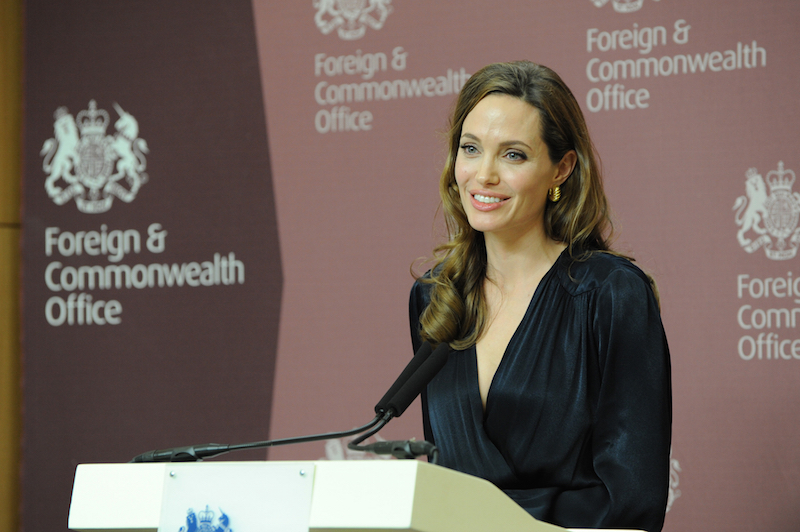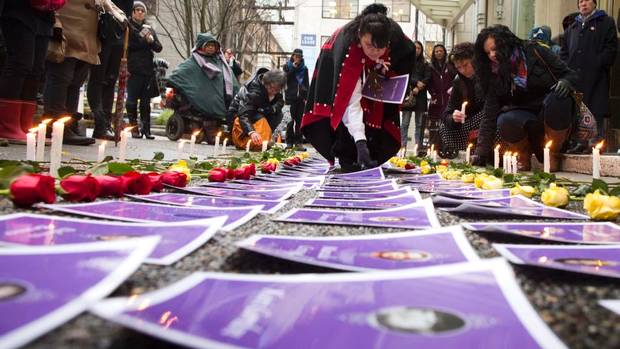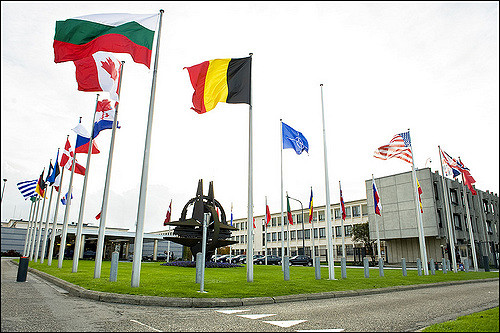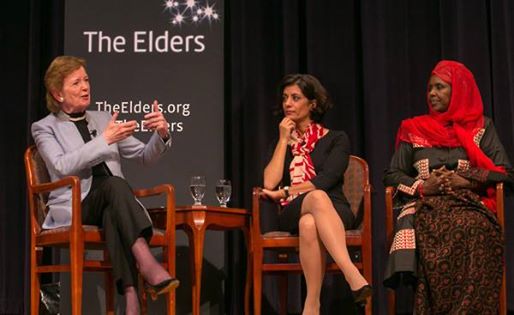On Monday, May 23, the London School for Economics (LSE) announced four new visiting professors in practice to its new Master’s program in Women, Peace and Security that will launch fall 2017. The unpaid positions involve delivering guest lectures, taking part in expert panels and events open to the public, and continuing existing field work and research. The new Master’s program will offer courses on “Gender and Militarization” and “Gender and Human Rights”, claims to be “the first of its kind internationally”, and promises to engage students with research in unexplored areas such as preventing sexual violence in conflict and women, peace, and security.
The four most recent staff appointees include Jane Connors, Amnesty International’s Director of International Advocacy; Madeleine Rees, Secretary General of the Women’s International League for Peace and Freedom, the Right Honourable Lord William Hague, former United Kingdom Foreign Secretary; and Angelina Jolie Pitt, United Nations High Commissioner for Refugees Special Envoy.
Both Hague and Jolie Pitt appointments have generated controversy. Professor Christine Chinkin, Director of the Centre for Women, Peace and Security at the LSE has endorsed the professorships of Jolie Pitt and Hague. In an article for The Conversation, she wrote, “They will all contribute – unpaid – to our public engagement. They will also occasionally inform our students about their work in order to enrich their academic study with practical knowledge and experience.”
Despite this support, many have questioned Jolie Pitt’s qualifications. The Independent spoke to one student, who felt that her appointment “[undermined] the university, students, staff, and ultimately, ‘our meritocratic society’”. The anonymous first year BSc International Relations and History student praised Jolie Pitt for her work for worthy causes but felt that “to teach Master’s students at one of Britain’s most prestigious universities . . . requires more than a surface insight into a topic.” Jolie Pitt has never had any formal training in relevant fields, with her formal degree in film at New York University.
Conversely, second-year BSc Government student Joel Pearce commented that Jolie Pitt has had “years of experience of activism, research in the field, and has played a big role in drawing attention to the issue of sexual violence in conflict.” He stated, “I think she’s exactly the kind of person LSE students should be learning from.” Pearce’s opinion reflects openness to learning based on applied experience as opposed to “detached and elitist academia”, a common complaint among students at postsecondary institutions today.
The Guardian’s Catherine Bennett has taken a less optimistic position regarding the appointments, characterizing both Jolie Pitt and Hague’s professorships as nothing more than a part of the “marketization of higher education” meant to help distract from the LSE’s poor performance in recent university league tables. Regarding Jolie Pitt, she has sarcastically remarked that creators of university ranking list “may want to consider adding a celebrity variable”, and “recalculated on that basis,” the LSE might perform better than it is currently faring.
Bennett also questioned Hague’s intentions and authentic interests in issues of women, peace, and security. Specifically, she recalled his dealings with countries known for subjugating women’s rights during his time as foreign secretary, including Saudi Arabia and Turkey, as well as his political scandal in 2013 when he called a parliamentarian “stupid woman” during a heated debate.
Still, Bennett did recognize that the majority of the LSE’s new degree courses would be taught by conventional academics with careers in research and publication. She also gave credit to Hague for his previous publications, including William Pitt the Younger, and Jolie Pitt’s Notes from my Travels: Visits with Refugees in Africa, Cambodia, Pakistan, and Ecuador.
While the LSE’s latest Visiting Professors announcement has generated discussion because of the celebrities involved, what remains most important is that they will be part of an innovative Women, Peace and Security program that will enrich research and awareness in an understudied field. Hopefully the appointment of such prominent figures will raise greater international awareness around women in security and make progress to alleviate their suffering in conflict situations around the world.
Photo: Angelina Jolie at the Foreign and Commonwealth Office at the launch of the UK initiative on preventing sexual violence in conflict, 29 May 2012. By Foreign and Commonwealth Office via Flickr. Licensed under CC BY 2.0.
Disclaimer: Any views or opinions expressed in articles are solely those of the authors and do not necessarily represent the views of the NATO Association of Canada.




